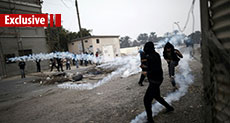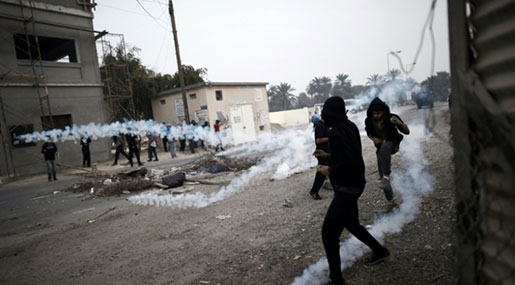
Bahrain Executions: The Beginning of a New Phase in the Repression of the People

Jihad Haidar
The origins of the decision to execute the three [Bahraini] nationals - which was adopted by the dictator of Bahrain Hamad Bin Isa Al Khalifa - is only an extension to the aggressive approach assumed by the royal regimes in Riyadh and Manama against the peaceful people of Bahrain.

However, the timing of this crime, which lacks both domestic and foreign dimensions, was not a rare coincidence. Its style and atrociousness were a translation of a thoughtful decision designed to upgrade the means of pressuring the people, who sought a peaceful approach in demanding their rights.
The execution of the three citizens in Bahrain, Abbas al Samea [27 years], Sami Mushaima [42 years], and Ali Al Singace [21 years] comes after the failure of all approaches adopted by Bahrain's dictator. Betting on the people getting weary or desperate did not pay off. Arresting and imprisoning their leaders, upgrading restrictive measures that even affected [Shiite] religious practices, and the decisions to arrest top leaders did not dissuade them. On the contrary, the Bahraini people showed resilience, peacefulness and adherence to their demands. This is what raised the concern of the Bahraini dictator and regional states that back him, [namely] Saudi Arabia, concerning scenarios related to the future of Bahrain and its people.
The execution and the escalatory steps appear to show that the Bahraini and regional regimes view time as a pressure factor that benefits the people; especially after the shattering of their illusion that the people or the [opposition] leadership would back down on their demands. This explains the diversity of the regime's repressive methods and its escalatory track. If it believed continuing with the recent situation was in its interest, it would have been satisfied with the recent level of repression.
The shift of the Bahraini regime towards killing through the method of execution - and what messages it sends - reveals its fear of the regional track where the Arab camp is being defeated, which in turn is causing the weakening of [Manama's] Saudi cover. This is a scenario that the Bahraini dictator fears would reflect negatively on Bahrain in case the peaceful demonstrations continued.
Whatever Saudi support the Bahraini dictator enjoys, the US factor remains the backbone of the international umbrella that provides both of them with support and security. That is what enabled them - specifically Saudi Arabia - to launch attacks against the peoples of the region, specifically the Bahraini and Yemeni people, as well as the Saudis themselves.
It is hard to overcome the effects of the messages the British Prime Minister, Theresa May, sent a few weeks ago through her participation in the Gulf Cooperation Council summit in Bahrain. It seems that stances she issued in support of the rulers of Bahrain and other Gulf countries, particularly her announcement that "the security of the Gulf is our security," was already ingrained in the consciousness of the Bahraini ruler and Saudi Arabia, encouraging them to escalate their measures against the Bahraini people. Add to that, the aggressive approach of the Trump administration towards Iran, due to assume a leadership role in Washington, which reinvigorated previously diminished hopes for challenging Iran and provided [the Arab monarchies] with more sense of confidence and arrogance, which may push them towards more repression and aggression at home.
Theoretically, we can talk about the existence of options that could have put an end to the crisis in Bahrain, and at the same time preserve the monarchy while satisfying some of the demands of the Bahraini people. But the Bahraini and Saudi regimes do not want this kind of option.
On the other hand and for various reasons, the Bahraini regime was dreading resorting to more dramatic options in confronting the Bahraini people. One of the reasons was because of the peaceful nature of the movement. Another reason was the risk of heading towards scenarios, still dreaded by the regional reality.
Between these two extremes, the Bahraini regime's measures, on which it is dependent to achieve what it aspires and hopes for at the level of suppressing the Bahraini people, was launched.
But the execution of the three citizens culminated in an escalation, which was being sketched out for some time. The executions were a translation of a dangerous decision taken by the Bahraini-Saudi regime aimed at forcing the Bahraini people toward choices they have successfully avoided so far.
The execution involves a set of messages the Bahraini regime wanted to send. Most notably: to bury any attempt at dialogue that will meet the minimum demands of the Bahraini people, the final announcement that there is no political settlement except the continuation of the status-quo, to express its willingness to cross red lines in the confrontation, to announce the start of a new phase in an escalatory context, and to establish a more aggressive stage.
In any case, it is difficult to understand the Bahraini regime's escalatory steps - even though it knows the gravity of their implications and consequences in advance - away from foreign relevant contexts and which form the fulcrum of the Saudi regime's orientation. Simply put, the Bahraini dictator bases his stay in power on regional and international support, without having any regard for internal factors. Thus, to accurately understand the decision of the crime and its implementation, it has to be considered as part of the Saudi regime's policies, aspirations, and the relationship of all the aforementioned to the coming stage on the Bahraini and regional levels.
Al-Ahed News



